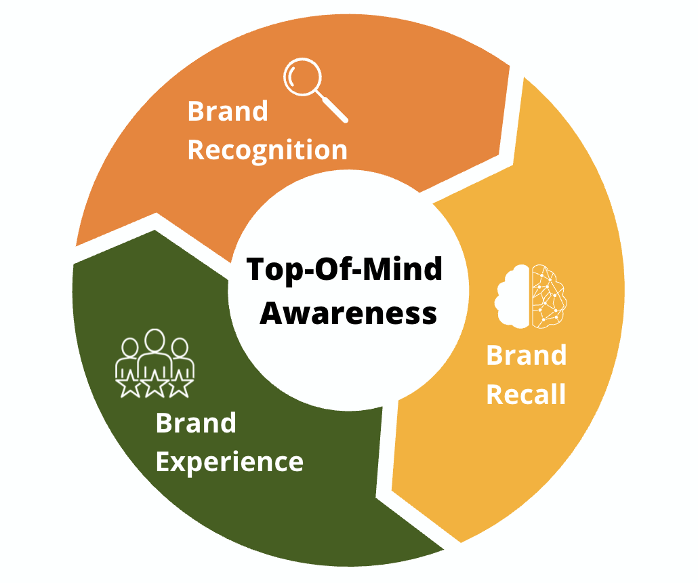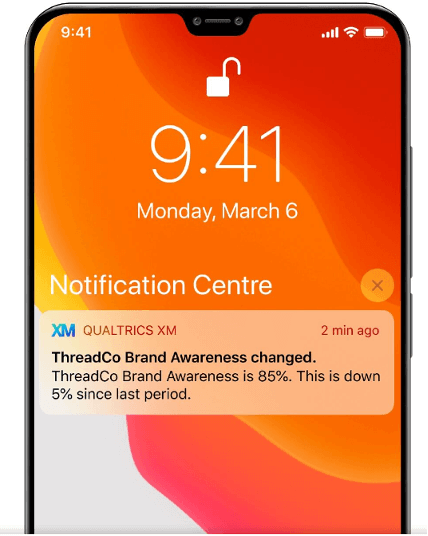What is brand recall?
Brand recall is the likelihood of someone remembering your brand, its products and its services, either by themselves or with a nudge in the right direction..
It’s much more than someone just being able to recognise your logo. It’s about being top of mind when thinking about an associated topic, and being the first brand to be named when asked about a particular product , service or business type.
Brand recall can be prompted, or it can happen spontaneously – here’s the difference below:
Aided brand recall
Aided brand recall is the type of recollection that happens when someone is prompted to think about a brand. If you were asked, “Do you know of Microsoft?”, you’re being helped to remember the brand.
Unaided brand recall
When you’re not offered a prompt, but still think of a brand, that’s unaided brand recall. The brand is so ingrained in the customer’s experience that the company’s products or services are the first to pop into mind. If you were asked, “What’s your favourite soft drink?” and you responded with, “Pepsi”, this is an example of unaided brand recall.
Measure your brand awareness with our free survey template
What factors affect brand recall?
Positive brand recall can be inspired by many factors. Advertising exposure, celebrity endorsements, strong messaging, a memorable jingle, great word of mouth references – there are ways to get your brand into the minds of potential customers.
To promote brand recall in your customers, you might want to focus on:
- Capturing customers with a memorable brand personality
- Creating a compelling brand story
- Developing an eye-catching logo or branding style
- Maintaining a positive brand reputation
- Having clear brand values, and sticking to them
- Communicating effectively and promoting your brand strategically
How does brand recall tie into branding strategy?
Brand recall forms part of top-of-mind brand awareness for customers. Along with brand recognition, it helps consumers to think of your brand spontaneously, connecting it to whatever their needs are. Brand experience is another factor that helps your target audience to think of you instead of your competitors – the better a time they have with your brand, the more likely they are to think of you next time they’re looking. Brand experience is the sum of all of your brand touchpoints, so it would be wrong to think of this as a tactic to improve awareness, but rather a layer above. However, getting the experience right will get people talking about you, and make it more likely a customer will think of you when they need something you provide.

Your branding strategies should focus on promoting your brand identity across your target market. With the right brand awareness, you can help customers to spontaneously recall your business, products and services instead of your competitors’.
Read the ultimate guide to brand strategy
What factors affect brand recall?
Brand recall can be inspired by many factors. Advertising exposure, celebrity endorsements, strong messaging, a memorable jingle, great word of mouth references – there are ways to improve brand recognition, and subsequently brand recall.
To build your brand recall potential, you might want to focus on:
Capturing customers with a memorable brand personality. Whether it’s fun and friendly or authoritative and serious, your brand personality helps your company to stick in people’s minds.
Creating a compelling brand story. Your customers might need your products and services – but to inspire greater spontaneous recall, you’ll need to create a compelling narrative. What journey do your customers go on if they buy into your services? What kind of person is your customer, and why are they cooler/smarter/more attractive etc. for having one of your products? We all remember things better when there’s a story attached – so make yours a good one.
Developing an eye-catching logo or branding style. Often, we’re sold not on the technical specs or the utility of an item, but how it looks. Your brand’s style should be instantly recognisable, even if all your customers are seeing is a colour palette.
Building and maintaining a positive brand reputation. Now more than ever, customers purchase more from brands they see as “good” or doing good things for the world. A positive brand reputation means you’re more likely to be recommended via word-of-mouth, one of the most trusted recommendation methods.
Having clear brand values, and sticking to them. How you treat your customers, your employees and the world at large matters. It’s not only the right thing to do – customers will remember a great experience or a generous action, and your brand will supersede others as a result in their minds.
Communicating effectively and promoting your brand strategically. It’s no good hoping your brand will be recalled if you don’t remind customers and potential new audiences that your brand exists. Reach out on the channels of their choice, in the way they prefer, and customers will remember you even when you aren’t marketing to them.
Why is brand recall important for business?
Brand recall can bring all sorts of benefits for your business. Top reasons for building brand recall include:
It increases your sales
Ideally, your brand should be the first to pop into customers’ minds when they’re thinking about a product or service they need.
Having strong brand recall means that when your customer is, say, considering buying a new mobile, they’re more likely to search for and buy from your mobile brand over others. Considering that 76% of US consumers interact with brands or products before they even set foot in a brand store, brand recall is key for increasing sales.
It makes you more competitive
If your brand is the top of the mental list in consumers’ minds when they’re thinking of a product, they’re more likely to purchase from you, rather than your competitors.
Make enough of an impression, and you’ll enjoy repeat purchases as customers become fans. Around 60% of global consumers prefer to purchase a new product from a brand they recall rather than change to a new brand. Creating a strong sense of brand recall in potential and existing customers can help you to keep customers coming back again and again.
It helps to cement your brand equity
The more likely consumers are to think of your brand first, the better the chances of developing brand equity. That’s the additional financial value that having a recognised brand adds to your products and services.
Brand equity can go a long way to convincing customers to buy. About 59% of consumers prefer to purchase from brands they trust, and 21% bought a product because they liked the brand.
What are examples of brand recall?
Let’s say that you’re doing home improvement, and you’re thinking of buying some tools to help you put up some shelves. You might think about getting items conveniently delivered – and immediately go to the Amazon app on your phone to find screws and nails. You recalled the ease of your customer experience with Amazon, and that led to your next purchase.
This unprompted brand recall is probably more likely to occur in daily life for many of your customers. However, there are circumstances where they might be prompted to recall a brand. Let’s say they’re watching the Superbowl, and a half-time ad for McDonald’s comes on. The McDonald’s name and logo might not be immediately shown, but the colour palette and products displayed to make the viewer think of the brand.
How to measure brand recall
As can be seen from these examples, brand recall can be a little hard to pin down and quantify. However, there are ways to determine how effective your brand is at being top-of-mind, including the brand recall survey.
What is a brand recall survey?
A brand recall survey asks customers to name brands they think of, indicating brands’ positions in their top of mind. A brand recall survey question looking for aided brand recall might be the following:
Which of the following bottled water products have you heard of
- Aquafina
- Dasani
- SmartWater
- BoxWater
An unaided recall question might include:
- What company would you use for booking a ride home?
- Which brand of dish soap do you use?
A brand’s potential to be recalled can be quantified in a brand recall rate. You’ll need to use this formula to determine yours:
Survey respondents who recalled your brand / the total number of respondents x 100
This gives you your brand recall percentage. A small brand might find itself with a small rate when compared to a market-leading competitor – but this can change over time with brand awareness efforts.
Create more than just brand recognition with Qualtrics
Though brand recognition is important, becoming deeply embedded in customer consciousness is what will convince people to buy from your brand.

Understand your audience with Qualtrics BrandXM™, and turn your brand into an instantly-recalled icon.
With BrandXM, you can:
- Identify the greatest areas of opportunity for your brand, so you can focus on strengthening the attributes that drive consumers and differentiate you from the competition
- Make decisions faster, with real-time access to brand insights and the ability to drill down whenever curiosity strikes
- Simulate scenarios for your brand so you can anticipate how your tactics can move key metrics like awareness or equity
- Understand the business value of your rebranding efforts and discover the factors that drive your success, easily replicating positive action
Try our Free Brand Awareness Template